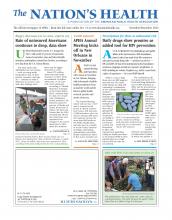While chickenpox may be a distant — and itchy — memory for many older Americans, the virus that causes it may lead to another disease that can be quite painful — shingles.
Shingles is a rash of fluid-filled blisters on an area of skin on one side of the body, says Michael Oxman, MD, a staff physician in infectious diseases at the Veterans Affairs San Diego Healthcare System and a professor of medicine and pathology at the University of California-San Diego.

Photo by Judy Schmidt, courtesy Centers for Disease Control and Prevention Public Health Image Library
Caused by the same virus that causes the chickenpox, a shingles rash is often preceded by several days of pain in the same area of skin, Oxman says. Anyone who has had chickenpox is at risk for getting shingles. That’s because the virus that causes chickenpox stays with you for life by sleeping in your nerve cells, he says.
“The sleeping virus is kept from waking up to cause shingles by immunity to it that developed during chickenpox,” says Oxman, a researcher funded by the Department of Veterans Affairs. “But this immunity decreases with age, and thus the risk of shingles increases with increasing age.”
Half of all U.S. cases occur in women and men ages 60 and older, according to the Centers for Disease Control and Prevention. The risk is also high for people whose immune system is weak due to factors such as HIV infection, cancer chemotherapy and treatments for people receiving bone marrow or organ transplants.
The pain of shingles may last for weeks, months or even years after the rash has healed for many older people, Oxman says. Such pain, a complication called post-herpetic neuralgia, is accompanied by changes in how the skin feels where the rash was, Oxman says.
“For example, you can have increased or decreased sensitivity to pinprick or touch, and even a light touch, such as clothing touching the skin or blowing air, can result in very unpleasant feelings,” Oxman says.
Other complications include possible loss of vision, hearing problems and loss of balance. Rarely, complications from shingles can be fatal, Oxman says.
If you develop a rash that you think may be shingles, it is important to seek immediate medical attention, even if it means a trip to the emergency room, Oxman says. There are effective antiviral medications your health professional can prescribe that can stop the virus from multiplying and limit harm, Oxman says.
“Don’t wait until the next day and don’t hesitate to ask the health care provider if your rash might be shingles,” Oxman says. “Not everyone thinks of shingles immediately.”
Early antiviral treatment can reduce your risk of health complications from shingles, Oxman says. The longer you wait, the more damage the virus will do and the less effective treatment may be. Shingles may also be more severe if you have a weaker immune system, he says.
If you do have shingles, CDC says it’s key to practice good hand-washing, refrain from touching the rash and keep the rash covered to prevent spreading the virus.
People with shingles should also take caution to stay away from pregnant women and people with weak immune systems until the rash is healed. While it isn’t possible to pass shingles to another person, it is possible for a person with shingles to pass the virus that causes it. That means if someone has never had chickenpox before, they can develop it after being in contact with a sick person’s fluid-filled shingles blisters, CDC says.
Fluid-filled blisters contain infectious virus and are a sign of an active infection, Oxman says. But a person is no longer contagious when all of the blisters are replaced with crusts or scabs, Oxman says. Scabs form in seven to 10 days and clear up in two to four weeks, according to CDC.
Shingles vaccination recommended for seniors
The best method of preventing shingles is to get a vaccination.
A single-dose, one-time vaccine is recommended for adults age 60 and older, CDC says. The vaccine is also recommended for people who have had shingles to prevent future occurrences, according to CDC.
Some retail pharmacies offer the shingles vaccine or patients can ask their doctors. A health professional such as a pharmacist or physician can inform you about the best route to get vaccinated.
For more information, visit www.cdc.gov/shingles
- Copyright The Nation’s Health, American Public Health Association









